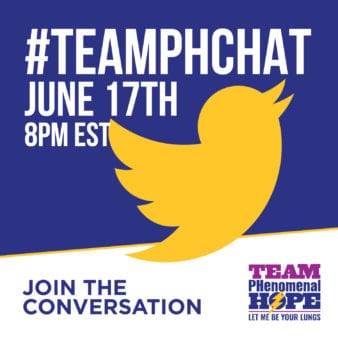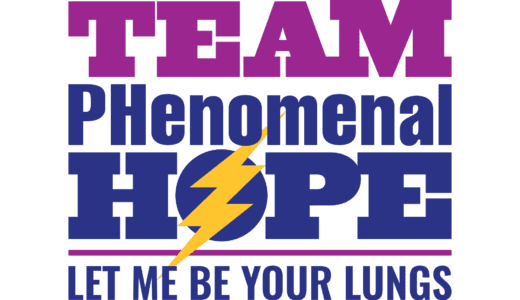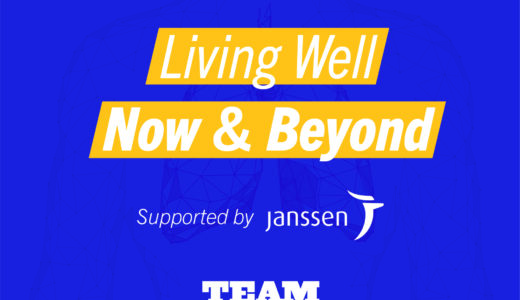#TeamPHChat Part Two Recap

We wanted to share a recap of our Team PH Twitter Chat, Part Two. This conversation centered around the COVID-19 pandemic and how our lives have evolved since the outbreak in March. This conversation was helpful to share thoughts and ideas surrounding an unprecedented situation.
Doctors, nurses, researchers, patients, and caregivers alike joined us from all over the world, including Arizona, California, Colorado, Illinois, New York, Pennsylvania, Virginia, and Wisconsin, and even as far as Alberta, Canada, and Cape Town, South Africa. We hope this discussion can provide you with information you were seeking and even some peace of mind as we get better understand this disease and more efficiently control the spread.
Question one: What is the biggest lifestyle or work life change you have had to make because of the pandemic?
“Home schooling my 15 year old and reminding her to wear her mask when/if she leaves the house. Just another thing I “nag” her about, lol.”
“I feel like everything changed. The nature of work changed. Telehealth visits for a period of time, and lots of work around COVID-19. Lots of reading and trying to keep up. And a lot less biking. No medical conferences.”
“Wearing mask when out, until recently we were wiping all groceries down. Just yesterday went to local Panera for first time and ate inside.”
“Visiting my daughter through a glass door.”
“Oddly enough, my work output has actually gone way up. Working from home took some getting used to, but I’m actually doing more stuff now than I was before. Lots of it pandemic-focused, but lots of it PH-focused.”
Question two: Has your routine care of pulmonary hypertension changed in any way (both as a doctor or as a patient) – Did you have visits or procedures postponed due to the pandemic?And pulmonary hypertension researchers, if your research changed, how did it change? In topic or how you conduct research?
“As a PH researcher, I could not ignore the potential COVID-19 effects on lungs and the right heart and actually wrote this paper summarizing potential effects of COVID on the right ventricle, see here.”
“The pulmonary hypertension research has continued here. The major difference has been all of those Zoom calls and the focus on backlog data.”
“As an anesthesiologist I take care of PH patients during and after surgery. After a drop in elective surgeries for a few weeks, we are back to normal volume, very vigilant on infection control for all patients, particularly ones with preexisting conditions such as PH.”
Question three: Do you know anyone personally who was infected with the coronavirus, SARS-CoV2?
“Yes, I do know of many people who were infected. Unfortunately, some of them lost their lives to this deadly virus.”
“I have taken care of patients with COVID-19 (no pulmonary hypertension patients, thankfully), and also have had friends and friends’ family members who have been sick with this disease. Also with a variety of symptoms/severity.”
“Thankfully, no! I’m hoping it stays that way!”
“I have the impression that low incidence places are related to low testing, and it is concerning for all our pulmonary patients out there that keep their routines as before the pandemic.”
Question four: Are you more or less concerned about the virus than you were in March?
“I have mixed feelings around this. I agree that more knowledge is super helpful to know how the virus spreads, etc. And I take all the precautions I have been taking. And luckily Colorado’s cases are not on the rise. But it’s also super stressful when I see people NOT taking basic precautions, especially as things open up. And it is also really disheartening to see the people perpetuating conspiracy theories around COVID-19. Some are bots but still.”
“I feel like some people see the decrease in stay at home orders and think things have improved and they do not need to take the precautions they were taking, if they were taking any at all before.”
“It helps with anxiety management to know more about how the virus spreads. I am more concerned now here in AZ because cases are on the rise.”
“Although I am taking exactly the same precautions as I was back in March, I am a little bit less concerned about the virus. This stems from knowing more about how the virus spreads and being more prepared.”
“I think that I am less concerned, but nervous that I’m feeling too casual about it. Trying to find that even ground.”
Question five: Are you going out more? Do you still take precautions?
“I’m going on drives, but not really going “out” as in near other people much. I have visited one friend recently but she has also been very carefully since she takes care of her father in law who has cancer, she can’t risk giving it to him.”
“Not really going out because others are not taking precautions and there is too much community spread.”
“As a pulmonary fellow, I felt during this time as a risk to others to this day regardless of all precautions. So I’m still not out there.”
“I am not, mainly because we’re still trying to figure out my meds and I’m too tired. The whole oxygen hauling around is a pain. When I do go out, I sometimes forget to wear a mask; not a routine yet.”
“Going out more (once a week to shops, taking all the precautions), and come back home convinced I have symptoms.”
See more COVID-19 resources here.



